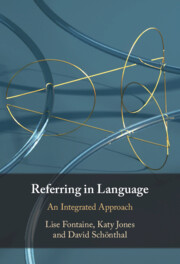Book contents
- Referring in Language
- Referring in Language
- Copyright page
- Contents
- Figures
- Tables
- Acknowledgements
- Part I The Nature of Referring and Referring Expressions
- Part II Typical Reference
- 4 Typicality and Atypicality
- 5 Referring in Spontaneous Discourse
- 6 Referring in Prepared Discourse
- Part III Atypical Reference
- References
- Index
6 - Referring in Prepared Discourse
from Part II - Typical Reference
Published online by Cambridge University Press: 22 June 2023
- Referring in Language
- Referring in Language
- Copyright page
- Contents
- Figures
- Tables
- Acknowledgements
- Part I The Nature of Referring and Referring Expressions
- Part II Typical Reference
- 4 Typicality and Atypicality
- 5 Referring in Spontaneous Discourse
- 6 Referring in Prepared Discourse
- Part III Atypical Reference
- References
- Index
Summary
This chapter examines reference in planned, deliberated language production. Using evidence from examples of institutional writing (writing text in academic, professional, and social settings), the effects of the written mode of production on referential choice, including evidence from keystroke logging methods which give us insight into revisions during the writing process. In comparison with spontaneous discourse, we demonstrate how the relatively low frequency of pronominal reference that is typical of spontaneous discourse is replaced with more complex referential expressions. We also consider whether referential choice is a feature of genre as we examine the referential profiles of different text types. The chapter concludes that referring expressions in prepared discourse tend to be more frequently information rich and consequently, the modification and qualification zones of the noun phrase are more active in this type of discourse.
Information
- Type
- Chapter
- Information
- Referring in LanguageAn Integrated Approach, pp. 108 - 124Publisher: Cambridge University PressPrint publication year: 2023
